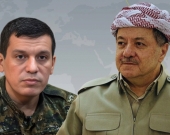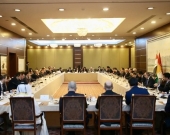Syria rebels executed civilians, says Human Rights Watch

A report by the US-based group says the deaths occurred in villages inhabited predominantly by members of President Bashar al-Assad's minority Alawite sect near the coastal city of Latakia.
It said the findings "strongly suggest" crimes against humanity were committed.
The group has previously documented atrocities by pro-government forces.
The report calls on the UN to impose an arms embargo on all groups where there is credible evidence of their involvement in war crimes.
'Entire families targeted'
Human Rights Watch says it conducted an on-site investigation in September and interviewed more than 30 people, including survivors and combatants on both sides.
Its 105-page report says that in the early hours of 4 August fighters from several different rebel groups attacked and overran army positions in the Sheikh Nabhan area of the Latakia countryside. A soldier told HRW that about 30 of his comrades were killed in the assault.
The rebels then entered the Alawite villages of Barouda, Nbeiteh, al-Hamboushieh, Blouta, Abu Makkeh, Beyt Shakouhi, Aramo, Bremseh, Esterbeh, Obeen, and Kharata.
"Eight survivors and witnesses described how opposition forces executed residents and opened fire on civilians, sometimes killing or attempting to kill entire families who were either in their homes unarmed or fleeing from the attack, and at other times killing adult male family members, and holding the female relatives and children hostage," the report says.
The report names 190 civilians killed by the rebels, including at least 57 women, 18 children and 14 elderly men. The total number of dead is likely higher because many residents remained missing and bodies were buried in mass graves, it adds.
Opposition sources say the women and children taken hostage in the attack are still being held. Relatives said many appeared in the background of a video published online.
HRW says about 20 opposition groups took part in the offensive and that five were involved in the attacks on civilians - the al-Nusra Front, the Islamic State of Iraq and the Levant (ISIS), Jaysh al-Muhajirin wa al-Ansar, Ahrar al-Sham and Suqour al-Izz.
None are affiliated to the Western-backed Supreme Military Council of the Free Syrian Army, though SMC chief Gen Salim Idris did say at the time that fighters under his command participated in the assault.
The report says ISIS and Jaysh al-Muhajirin are holding the hostages.
The government launched an offensive to retake the Sheikh Nabhan area on 5 August, ultimately regaining full control on 18 August.
'Co-ordinated, planned attack'
Joe Stork, acting Middle East director at HRW, said the abuses were "not the actions of rogue fighters".
"This operation was a co-ordinated, planned attack on the civilian population in these Alawite villages," he said.
The report says evidence including witness statements and a review of hospital records showed rebels executed or unlawfully killed at least 67 of the 190 dead civilians who were identified. For the remainder, further investigations are required.
A doctor at a hospital in Latakia said several of the bodies had multiple gunshot wounds, stab wounds or had been decapitated. Some were burnt or had their feet bound, he added.
The report says the high civilian death toll and the nature of the recorded wounds "indicate that opposition forces either intentionally or indiscriminately killed most of the remaining victims".
"The evidence strongly suggests that the killings, hostage taking, and other abuses committed by opposition forces on and after August 4 rise to the level of crimes against humanity."
HRW says Islamist rebel groups - which include foreign fighters - are financed by individuals in Kuwait and the Gulf. It calls on the UN to impose an arms embargo on all groups credibly accused of war crimes.
The organisation has also accused Syrian government forces of war crimes and crimes against humanity during the country's 31-month long conflict, most recently in a chemical weapons attack in several suburbs of the capital, Damascus, on 21 August.
Western nations blamed government forces for the attack, in which hundreds died, but President Assad said rebel fighters were responsible.
Experts from the global chemical weapons watchdog, the Organisation for the Prohibition of Chemical Weapons (OPCW), are currently overseeing efforts to destroy weapons production equipment in Syria.
Earlier this year, the UN High Commissioner for Human Rights, Navi Pillay, called on the UN Security Council to refer Syria to the International Criminal Court (ICC).
She said it "would send a clear message to both the government and the opposition that there will be consequences for their actions".
More than 100,000 people have been killed since the uprising against President Assad began in March 2011, according to the UN.
BBC












